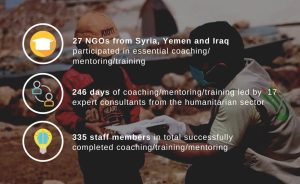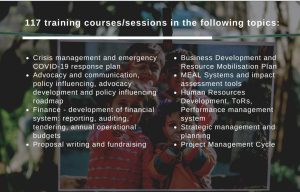Remote capacity building of Iraqi, Syrian & Yemeni NGOs to adapt to the COVID-19 context
The Programmes Department at the Humanitarian Academy for Development (HAD) has recently completed a project which aimed to build the capacity of LNGOs in three countries to adapt to the challenging COVID-19 context. The implementation of the project resulted in capacity building of 27 NGOs across the three countries, with 335 staff engaging in the coaching/mentoring, 117 capacity building activities and 246 days of mentoring and coaching.
The scope of the project was itself significant, particularly considering the short time scale of the project, but more significant than that was the approach used and the results of the project. In order to adapt to the COVID-19 context, the project delivered capacity building virtually using online platforms and digital communication. In addition, rather than traditional training, the project carried out an in-depth organisational needs analysis with each of the 27 LNGOs and from there was able to develop a tailored coaching and mentoring plan for each organisation. This plan went beyond simple training of the organisational staff, but incorporated more in-depth and detailed mentoring and coaching of the staff in order to ensure their adaptability and resilience through COVID and beyond. The ultimate aim of the project was to promote sustainability and business continuity in the LNGOs by addressing the gaps in their organisational capacity through tailored mentoring and coaching.
The Programmes Department at HAD worked with 17 subject matter experts and a regional project manager in order to ensure the content and approach of the mentoring and capacity building was context specific and addressed the needs of the LNGOs. In additional to developing the skills, knowledge and understanding of the LNGOs across a range of different core areas, the project also achieved some other unintended, but positive results.
For example, as a result of the mentoring and coaching, the LNGOs gained not only knowledge and skills, but also confidence in their abilities to adapt to COVID-19 and other challenging contexts. Feedback from the LNGOs and the mentors has shown that the NGOs are now able to not only develop new procedures and plans for resilience and organisational sustainability, but understand the importance of those procedures for their business continuity. In addition, they now have the confidence to adapt those procedures to different contexts as a result of the ‘learning by doing’ approach adopted by the project.
Another significant result of the project is that there has been a change in mind-set amongst the LNGOs to shift from thinking purely about their work in a developmental context to one that understands the importance of organisational structures required to ensure their sustainability through the current COVID-19 crisis. Many of the LNGOs had never been through a process of addressing and strengthening their organisational processes (rather than their technical abilities) and this project allowed them to think beyond their day to day activities to long-term strategic thinking that will allow them to be sustainable through crisis situations. Engagement with the project also allowed the LNGOs to think about how to adapt to the current COVID-19 crisis and to ensure they could continue to provide essential services and support to their communities. One respondent noted: “Because of COVID … the funding and the money from other countries to helping Syria is reduced now and that’s so difficult … Resource mobilisation [training/coaching] was very important, it’s a new concept for us, it helps us to think in a new way… COVID was also an important topic and we learnt new ways to add COVID-19 activities in the budget.”
As a result of this project, HAD will be looking at implementing further capacity building projects in Yemen and generally in the region. Another key take away from the project is that, while this project went some way in addressing the gaps in capacity, there are still significant needs within the LNGOs to ensure they continue to build, support and develop their communities. This project was funded by the H2H Network’s H2H Fund, which is supported by UK aid from the UK government. You can find out more information about the project here.
Written by Dr Vanessa Malila
Research and Development Officer









